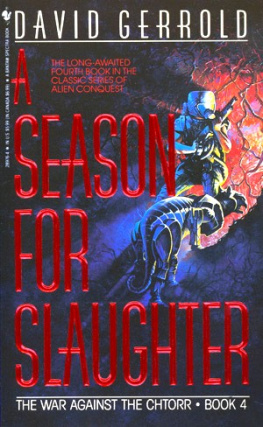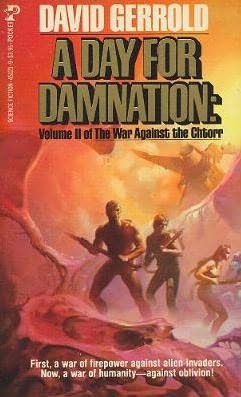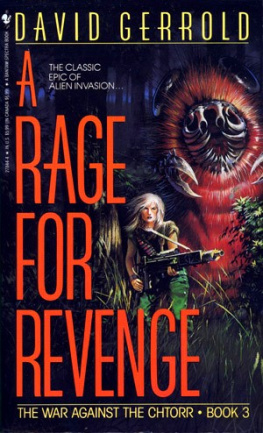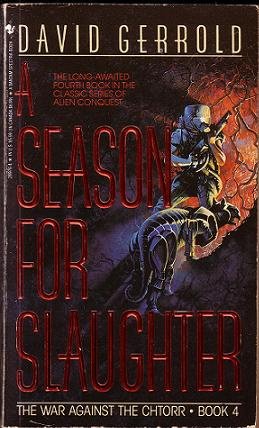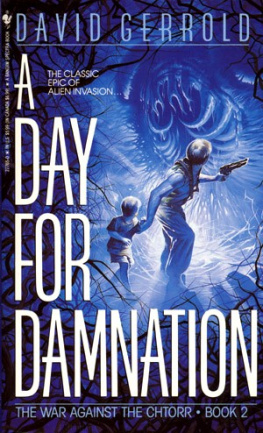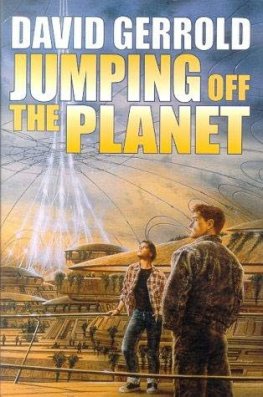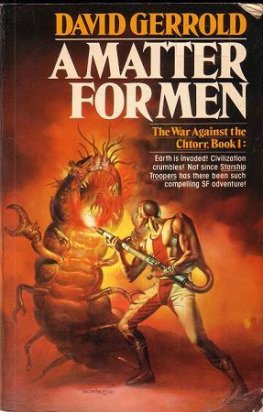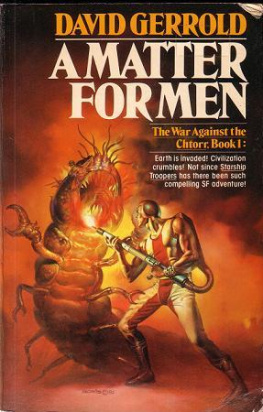A Season for Slaughter
The War Against the Chtorr
Book 4
David Gerrold
Chapter 1: The Stench
"Ninety percent of success is just growing up."
-SOLOMON SHORT
We smelled it long before we saw it.
The stench came rolling over the hills like a force of nature. I thought of great billowing thunderclouds of microscopic particles. I thought of corrosive chemicals attacking my bronchi, bizarre molecules bonding to enzyme sites in my bloodstream and liver. I thought of tiny alien creatures setting up housekeeping in my lungs. I thought of emigrating to the moon. Anything to be away from here.
The smell was almost a visible presence, and it was strong enough to knock down a house. Even filtered through the hoods, it was intolerable. It smelled like everything bad in the world, all in one place and distilled down to its most horrible essence. It smelled like putrefaction in a perfume factory. It smelled like day-old vomit and burning sulfur, swamp gas and rotten cheese. It smelled like worms and lawyers and last year's politics.
"Hooa! Lordy! What is that?" hollered one of the Texas boys. "Did we hit a skunk?"
"Smells more like lawyer."
"What's the difference?"
"Nobody wants to hit a skunk."
"Welcome to Mexico," said somebody in the back. "Land of a thousand exciting adventures."
"Cap'n," asked one of the new kids. "You ever smelled anything like that before?"
Before I could speak, the same voice in the back replied nastily, "It's the barrio.
This is the largest one in the world. They all smell like that."
"Only until we flush the gringos out." I recognized Lopez's softly accented voice.
"It's the leftover mayonnaise and white bread you're smelling."
"Cool it," I said. "You've got more important things to worry about. A smell like that is strong enough to attract every carrion eater from here to Waco. Pass the word. Keep an eye out." My eyes were already starting to water, but I didn't dare lift my contamination hood to wipe them.
We were in the leading rollagon. Behind us followed a convoy of four more. We bounced across the denuded hills like a deranged herd of dinosaurs. The deforestation here hadn't been recent, but it had been thorough. Nothing was going to grow here again for a long, long time. Obviously, no Chtorran agency had been responsible for this. What a stupid war this was turning out to be-we were supposed to be defending the Terran ecology; instead we were burning it away, destroying it to save it.
According to the original plan, Terran plants should have been reasserting themselves by now. There should have been sprouts of green everywhere.
Instead-we had a barren moonscape; a rumpled ash-colored terrain of uncomfortable hills and broken rock, all punctuated by blackened spikes, the remnants of a dead forest. A faint pink haze lay across the land; it gathered itself in dark brown pools and lurked in the deep gullies between the hills; and I wondered if this was the source of the smell. The pervasive undercast hid the horizon behind a bleary gray veil; distance just faded away into nothingness. Was this pale dry fog something Chtorran or another one of the delights engineered in the Oakland labs? It couldn't be the product of a living thing, could it? Nothing could live in this stench.
There was life here, of a sort; desperate, hungry, futile-and mostly Chtorran, of course. There were black ropy vines stretched across the ground, pulling at it like anchoring cables; and there were things growing on the vines, occasional bright patches of pink or blue or white, not quite flowers, but not quite anything else either.
There were patches of dark ultraviolet fungus and occasional curtains of red gauze hanging from dead tree limbs. Deep in the shadowed gullies we could see thick rubbery scars of wormberry, and the occasional clump of leafy black basil. As we rolled on, we started seeing purple coleus, midnight ivy, and the first bright patches of scarlet kudzu.
The kudzu was turning out to be especially nasty. All it did was grow, but that was enough. It looked like blood-colored ivy, and it grew even faster than its Terran counterpart. It could blanket a house in weeks, a forest in months. You could cut it back easily enough, but you could never quite eradicate it completely. It just kept coming back. It had the tenacity of a bill collector-only quieter. In Georgia a small army of civilians had burned back several hundred acres of it that was starting to get too close to the edge of Atlanta and found the bones of cattle; dogs, cats, and more than a few missing people. No one was quite sure of the killing mechanism yetor even if there was one. Maybe its danger was in its thickness; it was the perfect ground cover for small Chtorran predators. Like all things Chtorran, the best advice was still avoid it if you can.
Unless, of course, your job was to seek it out. Then you didn't have the luxury of that option.
This particular expedition was here at the specific request of the provisional governor of the Territory of North Mexico. We were one of three doing on-site mapping of the northeastern wilderness, to determine the success of last year's defoliation. I already knew the answer. I could have told them the answer before we'd left, before we'd even planned this operation. But-there are people who don't believe anything until they've sent somebody else to see-and even then, if it disagrees with what they want to hear, they still won't believe it.
The Brazilian mission had been sent back for reconsideration or put on hold or shifted to a back burner or ticketed for reevaluation or whatever you wanted to call it for the ninth or eleventh or hundred and third time. None of it had anything to do with the mission. All of it had everything to do with the political relationship of the North American Authority and the remaining nations of South America, several of which, including Brazil, had not reacted well to the Authority's recent annexation of South Mexico after that country's army and government had both collapsed in disarray. The relief operation was mounted from bases provided by the government of North Mexico. Despite, or perhaps because of, that cooperation, serious charges were being raised in many Latin capitals that the collapse of South Mexico had been engineered north of the Rio Grande.
I had no personal knowledge of the incident. I'd been involved elsewhere at the time, participating in an experiment in brainwashing, one of several then in practice.
But I wouldn't have been surprised to find an American presence in the matter.
South Mexico's not-so-secret-anymore cooperation with the Fourth World Majority in the abortive Gulf Coast invasion had not exactly won them friends in the hallowed halls of Congress. When it also turned out that they had allowed the invading forces to establish clandestine staging areas in the eastern wilderness, sixteen bills to declare war on South Mexico were introduced in the Senate. The President vowed to veto every one. The war against the Chtorr, she said, was more important, and this particular matter would be resolved in its own time and in its own way. She didn't specify what she meant, but after that the discussions on Capitol Hill became much more restrained.
Not too long after that, the United States and Canada created the North American Operations Authority, and each nation ceded specific parts of its national sovereignty to the new body; in particular the jurisdiction of all military and scientific bodies immediately involved in combating the ecological infestation. Both Mexicos had also been invited, but only the Republic of North Mexico had joined, and that only in exchange for significant trade agreements.
The obvious advantage of the Authority was that it allowed the United States to set the Moscow Treaties aside without specifically violating them. Giving control of your military to another body, which you just happened to control, was about as transparent as a lawyer's promise, but nevertheless legal. Not that anybody cared anymore, but the whole of politics is to find a way to legalize your particular crime.

